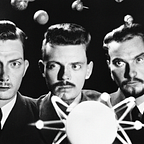Plants as pure sensation
A couple of mornings ago, in the process of waking up, I experienced darkness, and then suddenly a single point of sensation. A single point of contact.
I was confused about where “I” was as my systems booted up from sleep mode, pivotally unfolding from this single-axis interface point.
I tried to exert my will. I tried to push.
In so doing, I realized this was my finger-tip — of my index finger. Touching the edge of my pants. The point of sensation enlarged to a small orb of understanding. I moved my finger now consciously, my hand resting on my front, I was laying in bed on my back, now fully awake. Fully myself.
I realized suddenly, this must be what plants feel like.
Like pure sensation.
Foraging godfather Euell Gibbons said:
I would also say that — from my moral point of view — the vegetarian downgrades the life of plants by stating that it’s OK to eat them but not animals. Plants are alive too.
I mean, watch this time lapse video of the phototropic response in young corn plants and tell me that plants aren’t experiencing pure sensation mediated by the in-built mechanisms of their various tropic responses:
Sure, we have a scientific understanding of the chemical processes which go into controlling this complex plant behavior, but that doesn’t explain at all to us how amazing this must feel from the plant’s perspective.
Imagine how good you feel already as a human when you’re outside, and the sunshine is just right, and you can feel it invigorating your body. Now imagine you’re a plant, and you’re also eating that sunlight, and your whole body is stretch out reaching towards it, pulled as if by all-powerful magnet.
In other words, it must be super-freaking intense being a plant!
Because not only do you give yourself fully to the light, and strive towards it with all your intentionality and feeling, bodily. But you know no fear. You’re not an animal with “higher” functions like fear, existential dread or foreboding. Fight or flight isn’t an important consideration to expend your biological resources on when you’re basically sessile. You just pretty much focus on being awesome and growing.
Which explains why probably so many plants create useful, beneficial or beautiful products for so many other species. Because they are in a sort of state of continual creative ecstasy.
Or at least, that’s what my imagination says when I try to put myself into their roots. My intuition, anyway, confirms it as a valid extrapolation.
And if it’s true as far as a modality of understanding another life form, it would finally lay to rest this silly question of whether or not music impacts plant growth: because, basically, they are music.
